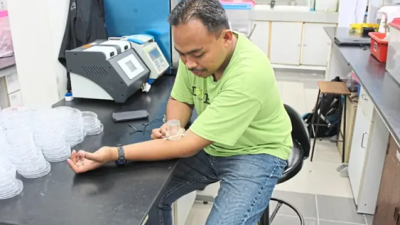Sin Chew Daily
From the day the WHO and China's National Health Commission shared the COVID-19 genome sequence data with the world on January 12, 2020, it has been full 500 days since the coronavirus started to ravage the world.
Looking back at the past one year plus, governments around the world, along with the common citizens, businesses, medical frontliners, military and police personnel, major pharmaceutical manufacturers, etc., have been doing their utmost to bring the virus under control.
On December 8 last year, the world's first Pfizer-BioNTech vaccine was administered in the UK, and on February 26 this year, prime minister Tan Sri Muhyiddin Yassin had his first jab.
Indeed, the vaccines are effective but as the outbreak has spread so much faster, coupled with the uneven distribution of vaccines among nations, it is impossible to rid the world of the virus within a short period of time.
According to WHO statistics, 1.47 billion COVID-19 doses had been administered worldwide as of May 17, at an average of 18.92 doses for every 100 people. However, this is still 10.85 billion doses short of the 12.32 billion doses needed to achieve herd immunity for 80% of the world's population to be inoculated. It is still a long way to go to resolve the problem of the virus by means of vaccination.
If the vaccine supply is adequate, it will help mitigate the spread of the virus. With a population of 332 million, the United States has so far administered more than 275 million doses at the rate of 82.83 doses for every 100 people. By comparison, it is 83.49 doses for every 100 people in the UK. Because of this, the pandemic has been significantly slowed down in the US, UK, France and a host of other countries.
On the contrary, in many Asian, African and South American countries, due to lack of access to more reasonable supply of vaccines, the inoculation rate is under one dose for every 100 people.

Given the repeated requests from WHO, the US announced on May 17 that it would release some 20 million doses of COVID-19 vaccines, but even this is insignificant.
Due to severe shortage of vaccines, so far only 1.93 million people in Malaysia have been vaccinated, or 5.92 for every 100 people. The vaccine supply will increase remarkably beginning next month, and to achieve the target of 80% of the population inoculated for herd immunity, we will need a total of 52.32 million doses. If we were to achieve that target by February 28 next year, we must administer at least 5.27 million doses every month from now on.
We believe the government has the ability to execute the immunization program as scheduled. But as our medical resources are currently tied down with treating severe COVID-19 cases, perhaps the government should consider allowing private hospitals to take part in the immunization program so that we can administer 5.27 million doses a month.
Despite the enforcement of MCO 3.0, the coronavirus outbreak is still very serious in this country. On May 18, we recorded the highest mortality of 47 deaths, while a record 6,075 new positive cases were reported on May 19, with the number of active cases at a staggering 47,340 and 862 cases either at ICUs or on ventilators.
All these numbers seem to tell us that the virus will knock at our door anytime, as more and more friends and people around us get infected or even killed.
Countries like Taiwan, Vietnam, Thailand, Singapore and Japan used to be star performers in the containment of the coronavirus, but the latest bout of explosive outbreaks have caught many of them unprepared, especially in Taiwan, Vietnam, Thailand and Japan which are experiencing delays in their vaccine delivery.
We have now come to a stage that we must seriously look at the issue of immunization. The effects of the vaccines are beyond question and we must get ourselves immunized as soon as possible.
As the virus is omnipresent, stay at home and protect ourselves as far as possible. Last but not least, stop spreading rumors and lies that doubt the efficacy of vaccines.
ADVERTISEMENT
ADVERTISEMENT


































